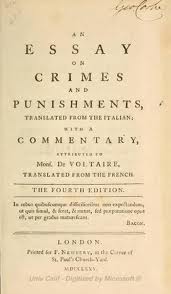Beccaria’s Biography
- born in 1738, in Milan, Italy

- part of an Aristocratic family
- friends with Pietro and Alessandro Verri, and they together formed a society called the “academy of fists”
- Beccaria had spoken to his friend, Pietro, about the legal system, gaining knowledge that he used to write his famous essay, “On Crimes and Punishment”, in 1764
- the essay’s key points related to not allowing torture and the death penalty, making Beccaria the father of criminology
“On Crimes and Punishment”: Basis for his concepts
- key focuses of this essay are on not having torture or the death penalty
- Beccaria bases his ideas on the concepts of social contract and utility
- Beccaria says that punishment is justified only to defend the social contract and to make sure that citizens are motivated to abide by it
- in terms of utility, Beccaria argues that the method of punishment selected should be that which serves the greatest public good
“On Crimes and Punishment”: Types of Punishment
- two branches of punishment would be retributionand utilitarian

- retribution is more revenge-oriented
- the other form of punishment would be utilitarian, which is the stance that Beccaria takes and uses as one of the guidelines for all of his concepts as stated before utilitarian punishment refers to the punishment increasing the amount of happiness in society
- therefore, this involves reforming the criminal, incapacitating repeat offenders, and deterring others
- in order to create more happiness in society, Beccaria believes that punishment must be in order to reform criminals instead of punishing them with vengeance, which explains why he is against capital punishment
“On Crimes and Punishment”: Swiftness of punishment
- argues that punishment should be swift since this results in the greatest deterrence for others in regards to committing crimes
- logic behind this is in relation to the theory of the association of ideas
- Beccaria believes that if a punishment quickly follows a crime, then the two ideas, crime and punishment, will be associated in a person’s mind faster
- as a result of the swiftness of punishment having the greatest impact on deterring others, Beccaria believes that there is no reason to have severe punishments, including the death penalty
- the link between a crime and a punishment is stronger if the punishment is somehow related to the crime
- however, realistically speaking by today’s standards in a democratic society, it would be unrealistic to expect that the time between the crime and the punishment would be within close proximity
“On Crimes and Punishment”: Torture
- in regards to torturing individuals to confess, another major point in Beccaria’s essay, Beccaria believes that torture would go against his utilitarian punishment beliefs
- torture does not consider the fact that the accused may actually be innocent and may even be forced into confessing in order to stop the torture
- as a result, this evidence does not view a person to be innocent until proven guilty and can be faulty and therefore, should not be considered valid in court
- a stronger guilty man may be able to withstand the torture and would then be released
Reactions to his work
- although numerous foreign enlightened rulers greatly accepted his work and wished to use it as a basis for reforming their justice system, others wanted Beccaria as a member of their court
- however, those in Italy did not think as highly of his work
- during the Venetian and Spanish Inquisition, Beccaria’s work was attacked
- this would also be understandable due to the fact that Beccaria was against torture and inquisitors tortured individuals in order for them to convert
Beccaria’s Legacy
- the US Constitution and Bill of Rights refers to the right to a speedy trial, rules against vagueness, right against cruel and unusual punishment, and to have coerced or tortured confessions be considered invalid
- Moreover, these rights were also in many other democracies’ charters later on, such as Canada’s
- Would Beccaria think we live in an enlightened age
- Beccaria would believe that we partially live in an enlightened age
- many countries still have the death penalty and torture
- although America’s constitution does state that cruel and unusual punishment is illegal, they still allow torture on American prisoners off American soil, such as Gitmo prison, until recently
- in regards to a speedy trial, countries like Canada and America say that a person must be tried within 2 years, however, certain criminal trials last much longer
